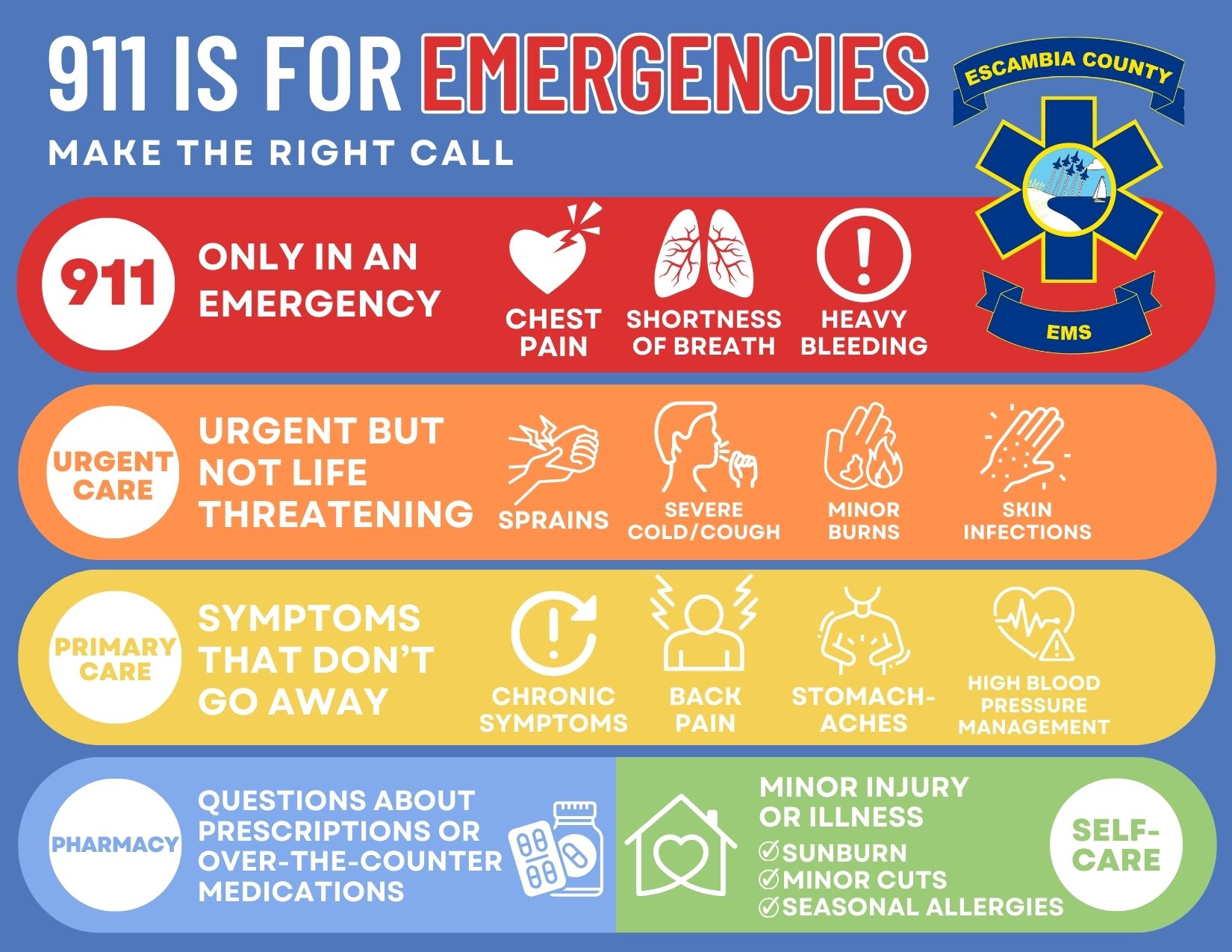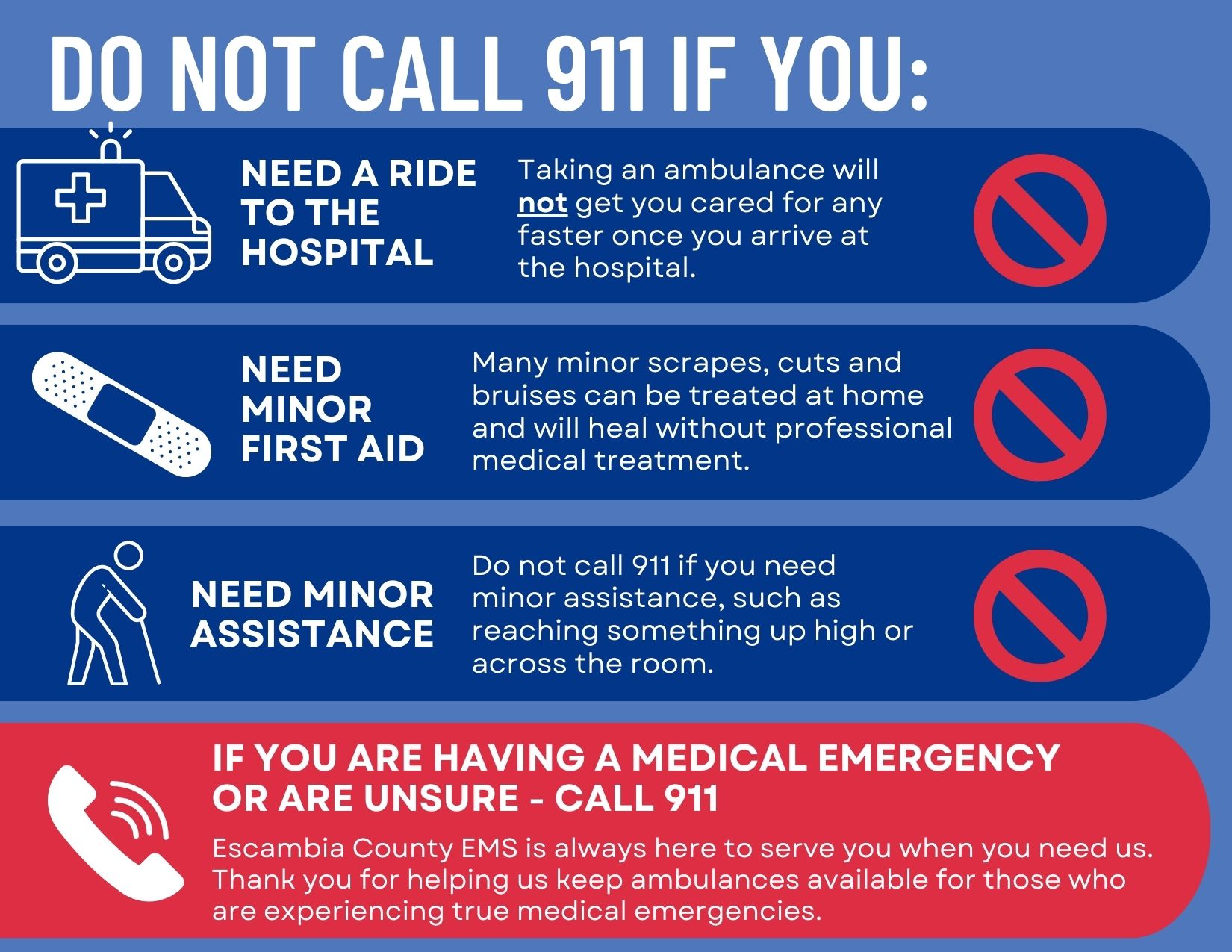Escambia County is offering helpful advice on when a resident should dial 9-1-1, especially when it comes to identifying medical emergencies. Throughout March, Escambia County Public Safety will share tips on calling 9-1-1 during emergencies and offer guidance on what someone can do during non-emergency situations.
As a reminder, 9-1-1 should only be used in an emergency. Citizens should keep in mind that not all medical situations require 9-1-1, and some issues are better handled by urgent care, primary care, a pharmacy or self-care.
Escambia County Emergency Communications answered 216,663 calls in 2023. During each of these calls, Escambia County Emergency Medical Services or Escambia County Fire Rescue responded. Often, both EMS and ECFR will respond depending on the severity of the call.
What was discovered was several of these calls were low acuity or non-emergent, resulting in an ambulance being diverted away from a potential or active emergency call. When several 9-1-1 calls are made all at once for an ambulance, the odds of emergency calls being held rise exponentially.
Do not call 9-1-1 for non-emergent situations such as:
- Non-life-threatening medical situations: Minor injuries or medical conditions that do not require immediate medical care do not warrant a 9-1-1 call. If you or someone you know has mild food poisoning, a slight fever, nausea, or a minor cut, consider calling a physician or going to urgent care.
- Requests for information: Calls for information, such as directory assistance, driving directions or road closures, should not be made to 9-1-1.
- Minor assistance: Do not call 9-1-1 if you need minor assistance, such as reaching something high up or across the room.
- Rides to the hospital: Do not call 9-1-1 just for a ride to the hospital if there is not an emergency medical situation.
If you are unsure whether the situation is a true emergency, officials recommend calling 9-1-1 and letting the call-taker determine whether you need emergency help.
Consider the following guide when determining who to call for non-emergency medical situations:
- Urgent Care (urgent but not life-threatening): Sprains, severe cold/cough, minor burns, skin infections
- Primary Care (symptoms that don't go away): Chronic symptoms, back pain, stomachaches, high blood pressure management
- Pharmacy: Questions about prescriptions or over-the-counter medications
- Self-care (minor injury or illness): Sunburn, minor cuts, seasonal allergies
Escambia County offers the following tips when identifying an emergency that requires immediate assistance:
- A medical emergency, such as someone who is unconscious, gasping for air or not breathing, experiencing an allergic reaction, having chest pain, having uncontrollable bleeding, or any other symptoms that require immediate medical attention
- A fire
- A crime, especially if in progress
- A car crash, especially if someone is injured
In an emergency situation that warrants a call to 9-1-1, be prepared to answer the call-taker’s questions, which may include:
- The location of the emergency, including the street address
- The phone number you are calling from
- The nature of the emergency
- Details about the emergency, such as a physical description of a person who may have committed a crime, a description of any fire that may be burning, or a description of injuries or symptoms being experienced by a person having a medical emergency
Escambia County Emergency Medical Services, a division of the Escambia County Department of Public Safety, is a provider of critical care, advanced life support, basic life support and bariatric transports. EMS provides these services to the over 300,000 residents of Escambia County.


